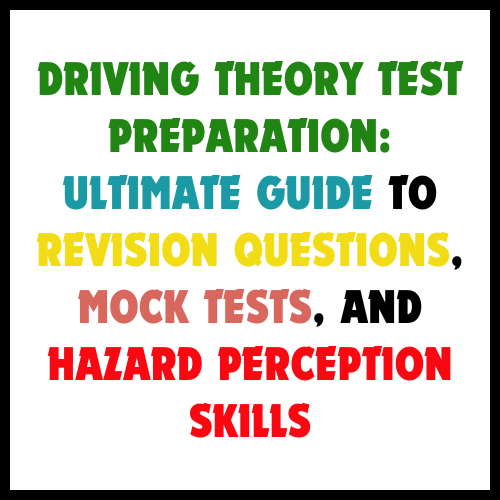Preparing for your driving theory test involves thorough theory test revision to ensure success. Start by practicing with our theory test revision questions and engaging in mock tests that cover the essential driving theory test categories. Understanding material from The Official Highway Code and familiarizing yourself with traffic signs will aid in your revision. Begin studying well before your test date to effectively cover all topics. While the national pass rate suggests the test can be challenging, proper preparation will enhance your performance. Don’t overlook the hazard perception test, which requires practice with CGI clips and developing hazard perception skills.

Remember, the theory test isn’t designed to trick you, so focus on understanding and applying driving and safety principles.
How should I prepare for my driving theory test?
To effectively prepare for the multiple-choice part of the driving theory test, practice using our theory test revision questions and answers. Our website offers mock tests that cover all the essential topics and specific questions related to each of the 14 driving theory test categories. Continue taking these mock tests until you have a solid grasp of the material and can consistently pass.
In addition to our resources, consider using the following for your theory test revision:
- The Official Highway Code: The theory test questions are derived from the Highway Code, so it’s crucial to familiarize yourself with it. Although it’s a lengthy read, having a copy is beneficial. We also provide an online version on our site.
- Know Your Traffic Signs: Road signs can be challenging for many candidates. Purchasing a copy of traffic signs can aid in your theory test revision and be useful throughout your driving career.
When should I start studying for my theory test?
Begin your study well in advance of booking your theory test. Spread out your study sessions over several weeks rather than cramming last minute. Starting your preparation at least a few weeks before your test will allow you to cover the material thoroughly. If you have any questions, don’t hesitate to ask your driving instructor.
Do I have to learn all the questions and answers?
It’s not necessary to memorize every single practice question and answer—there are over 900. Focus on understanding basic driving and safety principles, as this will help you answer most questions. Some questions, like those about stopping distances, do require memorization, but many can be answered with a bit of common sense.
Is the theory test hard?
The national pass rate of about 50% indicates that the theory test can be challenging. Adequate preparation is key to increasing your chances of passing. The hazard perception test is often considered more difficult, so make sure to allocate sufficient time to prepare for both sections.
How should I prepare for the hazard perception test?
The hazard perception test is tougher to prepare for since you can’t practice with the exact video clips used in the test. However, practicing with a variety of CGI clips and real-life videos from our library can be beneficial. Your driving instructor can also help you develop hazard perception skills by providing guidance on identifying and reacting to hazards.
Are there any trick questions in the theory test?
No, the theory test is not designed to trick you. Read each question carefully and choose the most logical answer.
TO PEN IT OFF
Effective preparation for your driving theory test is crucial for success. Utilize our theory test revision questions and mock tests to become familiar with the driving theory test categories. Study The Official Highway Code and traffic signs to solidify your knowledge. Start your preparation well in advance and address any uncertainties with your driving instructor. While the national pass rate reflects the test’s difficulty, thorough revision and practice, especially for the hazard perception test using CGI clips, will significantly boost your chances of passing. Approach the test with confidence, knowing it’s designed to assess your understanding rather than trick you.
